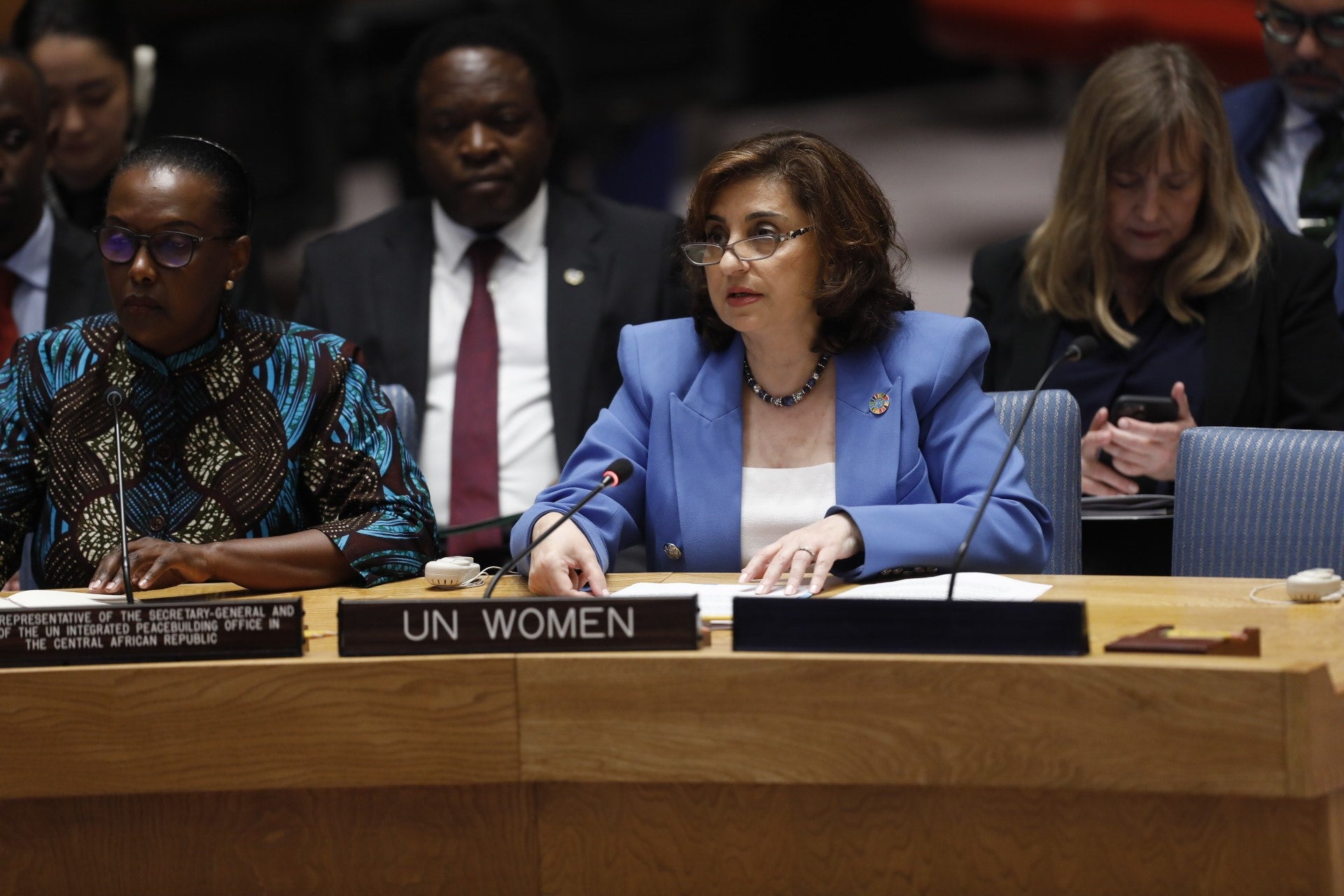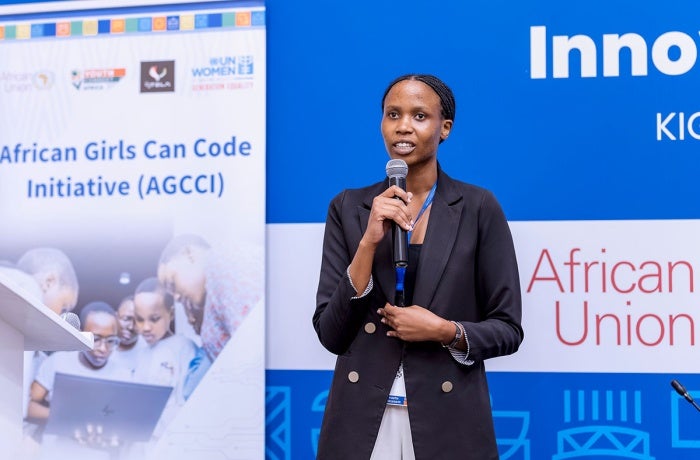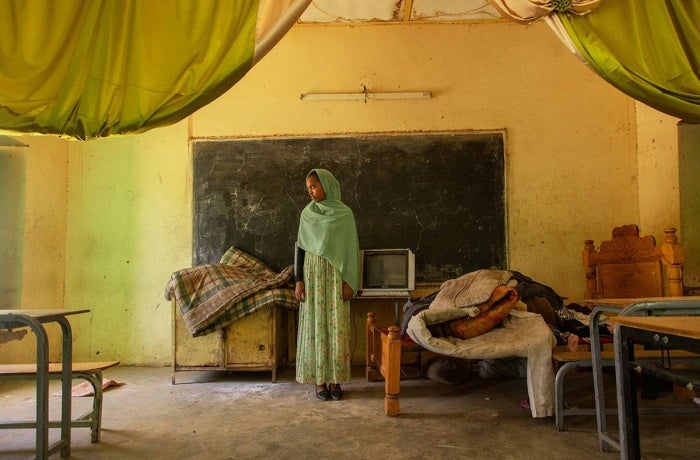Briefing: Fulfilling our commitments to the women of the Central African Republic
Briefing by UN Under Secretary-General and UN Women Executive Director Sima Bahous to the Security Council meeting on Central African Republic, 20 June 2023
[As delivered]
At the outset allow me to recognize World Refugee Day, and all those who are forced to flee their homes as a result of conflict, instability, and climate change, especially women and girls who are disproportionately affected. We honour all refugees today. We honour their courage, their strength and resilience.
One of the most repeated phrases in this Chamber in recent years is ‘women’s full, equal, and meaningful participation’. I want to focus on that today in the context of the Central African Republic, ahead of the constitutional referendum and the first local elections since 1988.

Women in the Central African Republic have had the parity law and a 35 per cent quota in all decision-making bodies since 2016. This remains in effect until 2027. The Government’s first national action plan on women, peace and security was adopted in 2014, and they are working on the third iteration of this plan. These are remarkable efforts and must be recognized and applauded.
I also commend the efforts of this Council in ensuring that the Security Council resolutions on the Central African Republic encompass clear directives on women, peace and security, including for the mandates of both the peacekeeping mission and the sanctions committee. And yet, women continue to be extremely marginalized in decision-making in general, and in peace processes in particular.
As in many other countries on the agenda of this Security Council, there is no lack of norms or plans.
It is their inadequate implementation, enforcement, or funding, that is failing the women of the Central African Republic.
When the 2019 peace agreement was signed, women were only 8 of the 78 delegates representing the different parties, and only 1 of the 14 signatories. All 11 of the facilitators designated by the African Union were men. Currently, there are no women in the monitoring mechanism of the Luanda Roadmap. The numbers are not much better in national dialogues. In the Bangui Forum in 2015, women constituted only 20 per cent of the 800 participants. In the 2022 Republican Dialogue, only 17 per cent of the 450 participants were women.
Perhaps the most positive example of women’s representation is the Commission on Truth, Justice, Reparations and Reconciliation, with 5 women among its 11 members, including the president. Yet, two years after its launch, it continues to lack the financial resources to get it off the ground. And in several of the key committees dealing with peace and security issues, like disarmament, demobilization and reintegration, or security sector reform, women’s representation is marginal or non-existent.
In the 2021 elections, in spite of the parity law, the percentage of women in the National Assembly increased only modestly, from 8 to 12 per cent. There are clear indications why this is so. Out of more than 1500 candidates, only 15 per cent were women. Party lists were validated and accepted, despite failing to meet the quota.
In a study UN Women conducted last year, we found that 43 per cent of women candidates were victims of physical violence during their campaigns. They were threatened by armed groups, even kidnapped. Women voters were refused entry into voting centres or turned back because they lacked birth certificates.
Some mechanisms did make a difference though. The UN set up hotlines and situation rooms for women across the country. In one case, a woman candidate was being threatened by armed men and called the hotline to relay her location, with the sound of gunfire as her background. The peacekeepers closest to her location were swiftly mobilized, and the armed men left. Today, she is a member of parliament. Let us all applaud her.
As in many other countries, in the Central African Republic, women are very active building peace, mediating conflicts at the local level, and protecting their communities. They do this often at their own risk and expense. In many cases, they overcome sexual violence, conflict-related psychological trauma, and the loss of husbands, to care for the rising number of orphans and adopt new roles as breadwinners amid acute food insecurity. Nearly one in two households in Central African Republic is now headed by women.
Excellencies, on the whole, we are falling short of both our commitments and the aspirations of the women in Central African Republic.
Several of the women invited here from civil society have told you that women are often only engaged in consultations in the margins or when missions from external actors visit the country. They are rarely invited to input meaningfully into decision-making processes; and initiatives targeting women rarely feed into the formal peace process. There is a vibrant civil society in Central African Republic, yet women report that for them the civic space is closing.
The conflict and the humanitarian emergency have exacerbated many issues that disproportionately affect women and girls—and that has a direct bearing on their ability to participate ‘fully, equally and meaningfully’ in their communities.
We need their voices and their agency. Yet they risk harassment, including from armed groups, if they speak up or collaborate with the Government or the UN. More broadly, gender-based violence is on the rise, strongly correlated to arms proliferation. Just one third of rape survivors are able to access clinical management within 72 hours. And the list goes on.
The many brave young women who want to shape the future of their country must be given the space and the resources to do so. We must all do our part to create this space.
We are at a crucial juncture for women’s participation, with a constitutional referendum and elections that could result in instability and violence again.
While much can be said about the resurgence of attacks by armed groups, ethnic conflict, the spillover effects of the crisis in Sudan, and the regional and global dynamics at play in Central African Republic, the extreme under-representation of women in all decision-making is rarely mentioned or addressed.
And yet it is one of the reasons we keep going through cycles of violence and instability, and addressing it is one of our best hopes for a future for the country.
In the coming months, the constitutional referendum and the local elections are more likely to be peaceful under the following four conditions that I recommend to you:
-
If women activists can speak their mind freely,
-
If women’s organizations have the resources to build peace and social cohesion in their communities and mitigate tensions,
-
If women candidates can run for office without threats and harassment, and
-
If international partners work together with the government and civil society in the country to ensure their upcoming milestones contribute to peace rather than risk further instability.
I urge you to reinforce this message, both in the Security Council and as partners of the Central African Republic.
I thank you.









